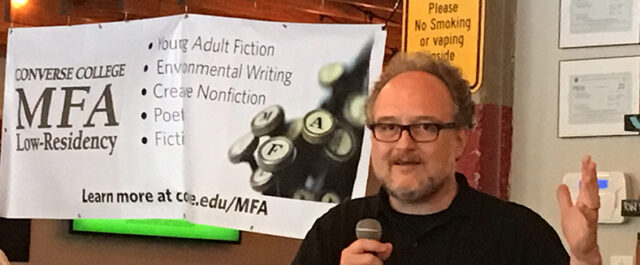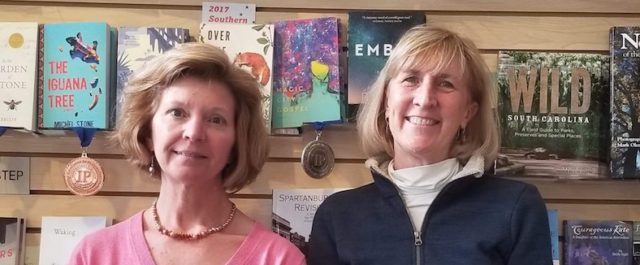Katie P. Sherman
On the corner of King and W. Main Street, in a renovated Masonic Temple, you’ll find the home of The Hub City Writers’ Project (HWCP). The building — which houses a coffee shop, bakery, independent bookstore, and the Hub City Press offices — is impressive in and of itself with striking white columns and an intricate stone awning. However, its façade is nothing in comparison to the formidable ideas being exchanged within. The Hub City Writers’ Project has spent nearly 25-years fostering a literary community dedicated to Southern stories. For those who believe Southern stories became extinct following the deaths of Flannery O’Connor and Eudora Welty, think again. Each year, Hub City Press publishes six to eight novels and collections from Southern writers shouting to be heard and, while each voice is unique, the message is clear. ‘This place has more to say!’
I recently sat down with Anne Waters (Executive Director of the Hub City bookstore) and Meg Reid (Director of Hub City Press and Programs) to discuss the future of their press, the importance of literary voice, and upcoming events which shouldn’t be missed.
S85: Tell me a little about the HWCP? How did you get started?
AW: The bookstore is the youngest component, started eight years ago. In 1995, a group of writers started chatting about what their community really needed. They all agreed Spartanburg needed literary identity. They wanted a place to knock around ideas. They wanted comradery.
MR: [Our founders] needed somewhere where after you’ve spent time alone in your room writing, you can engage with other people. That’s what humans were designed to do!
S85: And so HWCP was born. How have the original goals shifted?
AW: They’ve exploded! We are still coming from this same idea of place. But I think our organization has gone well beyond anyone’s dreams. The majority of major presses have shifted from the south. We saw a vacuum that Hub City could fill.
MR: The bookstore really supports and puts money back into the press. I don’t know if that was the original intention but it works. The press provides influence and voice to the bookstore. We try to curate our collection by purchasing books with integrity. The majority of books are well-written and crafted. They speak to the audience intended. I wouldn’t take every book as there are some with different philosophies but, they speak to their audience with authenticity.
S85: How have you fostered a connection to the Spartanburg community?
AW: We do a lot of collaborations. Last spring, we partnered with Spartanburg Youth Theater to stage a play here. The kids won prizes and got tickets. We also do programming with the library. We sponsor book clubs, including a feminist book club called “her story.” We have a cookbook club, which gives us a chance to break bread in the community. We aren’t just about lofty ideas. We have programming that is cross genre, age group, and ethnic groups.
S85: What have you learned through this process?
AW: No job is too small. No idea is too big.
S85: Your goal was to create a literary community and if people come to your events, they’ll see many of the same faces again and again. Some are literary tastemakers including C. Michael Curtis, longtime editor of The Atlantic. You recently ran a contest in honor of Curtis. What is his relationship to HCWP?
MR: He reads manuscripts for us. He’s still an editor. He’s very active and, alongside his wife Betsy Cox, he’s a dear friend.
S85: Tell me a little about the winner of the contest. Were you all pleased?
MR: It is a favorite of ours. The author, Emily Pease, published individual stories throughout the years in high quality journals including The Georgia Review, The Missouri Review, and Shenandoah. We couldn’t have chosen better. In three rounds of judging, this book stood out each time. Emily has been working and writing for over 30 years. She has an incredible resume but no one had bought the book. The industry is obsessed with young people and we’re so glad we could give an opportunity and a life-changing amount of money to someone who has dedicated her life to craft. The book, Let Me Out Here, will be released next month.
S85: What are some things HCWP is doing that no one else is?
AW: We’re good at taking a book from inception to packaging and editing. We are small and deliberate in what we publish. Sometimes this is painstaking. We are all passionate about what we do. Ultimately, our goal is to nurture writers and cultivate readers. This means we try to reach the community as a whole. Everyone from tiny tots and annual book drives to speaking at book clubs. We want everyone to feel this place is the center.
MR: We are a very tight knit community and we have fostered relationships over lifetimes. I don’t think everyone can say that. Outside that, we use lots of social media and branding tools, top to bottom. We try to really engage with people. If you have a question, we try to answer it. That pays back when we put content about our books up.
S85: What is the best thing about this job?
AW: The people.
S85: What is the worst thing?
AW: The people [laughs]. No! Honestly, there aren’t a lot of drawbacks. The people I work with are very ambitious and hard-working. This also means we’re all tired though!
S85: What are some of the challenges of running a small press?
MR: There are many. Publishing generally is hard. Getting people to pay attention to books is hard. The six to eight books you’re publishing are important and you want people to take notice. Still, there’s limited time in a day. We have a small staff!
S85: So let’s get the word out! What’s coming out from HCWP this spring?
MR: We have the best spring lineup. As we mentioned, the winner of the initial C. Michael Curtis short story prize by Emily Pease will be out soon. The Magnetic Girl by Jessica Handler is a great feminist read. Booksellers love her and we do too! In May, an anthology about fishing called Gather at the River [edited by David Joy and Eric Rickstad] is coming out. David Joy brought it to us and was adamant that all proceeds go to the charity Cast for Kids. Right now, we are publishing a lot of women. For a long time, we’ve been an all-female staff and that feels like part of our brand at this point. We try to, to some extent, combat the rampant sexism and ageism within the industry!
About the Publishers
 A native Arkansan, Anne Waters worked for twenty years in regional book publishing before taking a break to raise her son, Eli. During that time she ran an art gallery and yoga studio. She is thrilled to be back working in the world of bookselling and publishing. What she is reading: The Handmaid’s Tale (I just saw Margaret Atwood at Winter Institute); What she just finished: Jessica Handler’s The Magnetic Girl published by Hub City Press; What is next in her stack: Etaf Rum’s debut novel A Woman is No Man.
A native Arkansan, Anne Waters worked for twenty years in regional book publishing before taking a break to raise her son, Eli. During that time she ran an art gallery and yoga studio. She is thrilled to be back working in the world of bookselling and publishing. What she is reading: The Handmaid’s Tale (I just saw Margaret Atwood at Winter Institute); What she just finished: Jessica Handler’s The Magnetic Girl published by Hub City Press; What is next in her stack: Etaf Rum’s debut novel A Woman is No Man.
 Meg Reid is a book designer, editor and writer living in South Carolina. Her literary essays have appeared online in DIAGRAM, Oxford American, the Rumpus, and elsewhere, and she also writes extensively about design. Her MFA in Nonfiction is from University of North Carolina Wilmington, where she served as Assistant Editor of the literary magazine, Ecotone, and worked for the literary imprint Lookout Books. She currently lives in Spartanburg, South Carolina, where she is Director of Hub City Press. The most recent book she’s read and adored is Impossible Owls by Brian Phillips.
Meg Reid is a book designer, editor and writer living in South Carolina. Her literary essays have appeared online in DIAGRAM, Oxford American, the Rumpus, and elsewhere, and she also writes extensively about design. Her MFA in Nonfiction is from University of North Carolina Wilmington, where she served as Assistant Editor of the literary magazine, Ecotone, and worked for the literary imprint Lookout Books. She currently lives in Spartanburg, South Carolina, where she is Director of Hub City Press. The most recent book she’s read and adored is Impossible Owls by Brian Phillips.
About the Interviewer
 Katie Sherman is a journalist and an award-winning author who covers fine food and parenting—two things rarely related—in Charlotte, NC. This year, she was nominated for the Pushcart Prize. Katie has an MFA in fiction and an affinity for Southern Gothic literature, cider beer, Chicago, and morning snuggles with her two daughters. She has published extensively in literary magazines across the country. She just finished reading The Great Believers and loved it so much! Next on her nightstand is Everything Here is Beautiful.
Katie Sherman is a journalist and an award-winning author who covers fine food and parenting—two things rarely related—in Charlotte, NC. This year, she was nominated for the Pushcart Prize. Katie has an MFA in fiction and an affinity for Southern Gothic literature, cider beer, Chicago, and morning snuggles with her two daughters. She has published extensively in literary magazines across the country. She just finished reading The Great Believers and loved it so much! Next on her nightstand is Everything Here is Beautiful.
Featured Image: Left to right; Executive Director of the Hub City Bookstore, Anne Waters, with one of HCWP’s founders Betsy Teter.

 A. J.
A. J. 

 Lisa Hase-Jackson, who has served South 85 Journal in the past as its Review Editor, brings a wealth of experience to the role of Managing Editor. She is the author of the recently published poetry collection Flint & Fire, selected by Jericho Brown for the 2019 Hilary Tham Capital Collection. Her poetry has appeared in such journals as The Midwest Quarterly, Kansas City Voices, The South Carolina Review, among others. Born in Portland, Oregon, and raised primarily in the Midwest, she has lived and taught in such cities as Seoul, Albuquerque, and Kansas City. She completed her BA at Washburn University, her MA at Kansas State University, and her MFA at Converse College. She currently lives in Charleston, South Carolina, where she edits Zingara Poetry Review, and teaches creative writing and honors courses at the College of Charleston.
Lisa Hase-Jackson, who has served South 85 Journal in the past as its Review Editor, brings a wealth of experience to the role of Managing Editor. She is the author of the recently published poetry collection Flint & Fire, selected by Jericho Brown for the 2019 Hilary Tham Capital Collection. Her poetry has appeared in such journals as The Midwest Quarterly, Kansas City Voices, The South Carolina Review, among others. Born in Portland, Oregon, and raised primarily in the Midwest, she has lived and taught in such cities as Seoul, Albuquerque, and Kansas City. She completed her BA at Washburn University, her MA at Kansas State University, and her MFA at Converse College. She currently lives in Charleston, South Carolina, where she edits Zingara Poetry Review, and teaches creative writing and honors courses at the College of Charleston.
 A native Arkansan, Anne Waters worked for twenty years in regional book publishing before taking a break to raise her son, Eli. During that time she ran an art gallery and yoga studio. She is thrilled to be back working in the world of bookselling and publishing. What she is reading: The Handmaid’s Tale (I just saw Margaret Atwood at Winter Institute); What she just finished: Jessica Handler’s The Magnetic Girl published by Hub City Press; What is next in her stack: Etaf Rum’s debut novel A Woman is No Man.
A native Arkansan, Anne Waters worked for twenty years in regional book publishing before taking a break to raise her son, Eli. During that time she ran an art gallery and yoga studio. She is thrilled to be back working in the world of bookselling and publishing. What she is reading: The Handmaid’s Tale (I just saw Margaret Atwood at Winter Institute); What she just finished: Jessica Handler’s The Magnetic Girl published by Hub City Press; What is next in her stack: Etaf Rum’s debut novel A Woman is No Man. Meg Reid is a book designer, editor and writer living in South Carolina. Her literary essays have appeared online in DIAGRAM, Oxford American, the Rumpus, and elsewhere, and she also writes extensively about design. Her MFA in Nonfiction is from University of North Carolina Wilmington, where she served as Assistant Editor of the literary magazine, Ecotone, and worked for the literary imprint Lookout Books. She currently lives in Spartanburg, South Carolina, where she is Director of Hub City Press. The most recent book she’s read and adored is Impossible Owls by Brian Phillips.
Meg Reid is a book designer, editor and writer living in South Carolina. Her literary essays have appeared online in DIAGRAM, Oxford American, the Rumpus, and elsewhere, and she also writes extensively about design. Her MFA in Nonfiction is from University of North Carolina Wilmington, where she served as Assistant Editor of the literary magazine, Ecotone, and worked for the literary imprint Lookout Books. She currently lives in Spartanburg, South Carolina, where she is Director of Hub City Press. The most recent book she’s read and adored is Impossible Owls by Brian Phillips. Katie Sherman is a journalist and an award-winning author who covers fine food and parenting—two things rarely related—in Charlotte, NC. This year, she was nominated for the Pushcart Prize. Katie has an MFA in fiction and an affinity for Southern Gothic literature, cider beer, Chicago, and morning snuggles with her two daughters. She has published extensively in literary magazines across the country. She just finished reading The Great Believers and loved it so much! Next on her nightstand is Everything Here is Beautiful.
Katie Sherman is a journalist and an award-winning author who covers fine food and parenting—two things rarely related—in Charlotte, NC. This year, she was nominated for the Pushcart Prize. Katie has an MFA in fiction and an affinity for Southern Gothic literature, cider beer, Chicago, and morning snuggles with her two daughters. She has published extensively in literary magazines across the country. She just finished reading The Great Believers and loved it so much! Next on her nightstand is Everything Here is Beautiful.

 Andrea Marcusa is a writer of literary fiction and essays that have appeared in The Baltimore Review, River Styx, Epiphany, New South, and others. She’s received recognition from the writing competitions Glimmer Train, Third Coast, Ontario Review, Ruminate Magazine, and New Letters and been nominated for several Pushcart Prizes.
Andrea Marcusa is a writer of literary fiction and essays that have appeared in The Baltimore Review, River Styx, Epiphany, New South, and others. She’s received recognition from the writing competitions Glimmer Train, Third Coast, Ontario Review, Ruminate Magazine, and New Letters and been nominated for several Pushcart Prizes.

 Ezra Koch recently relocated to Portland, Maine, with his wife, daughter, and son, after living as a guitar maker in Santa Cruz, California for a decade. He has an MFA from the University of San Francisco and has been published as a poet and journalist. His debut novel, The World Belongs to the Askers, is being represented by Trident Media Group.
Ezra Koch recently relocated to Portland, Maine, with his wife, daughter, and son, after living as a guitar maker in Santa Cruz, California for a decade. He has an MFA from the University of San Francisco and has been published as a poet and journalist. His debut novel, The World Belongs to the Askers, is being represented by Trident Media Group.